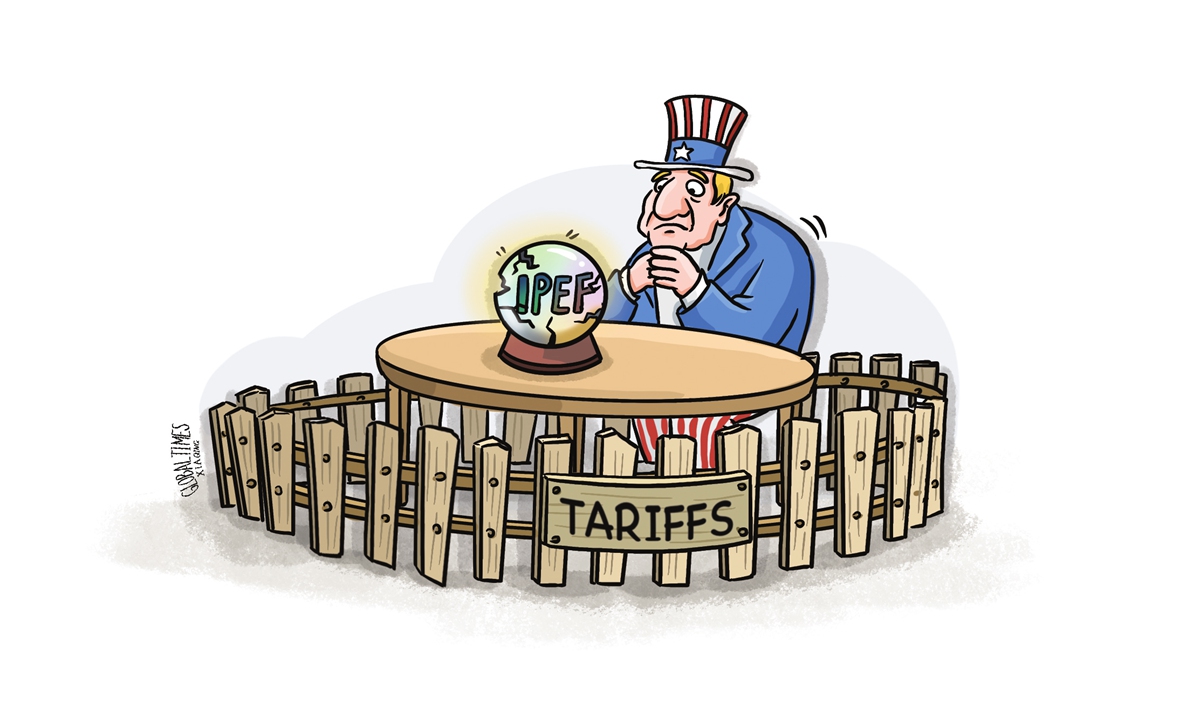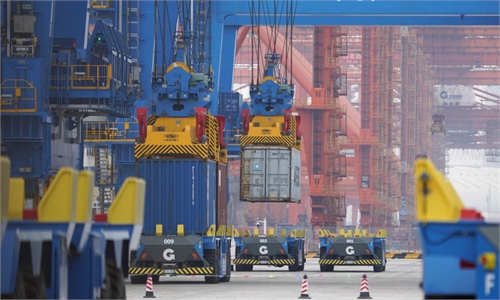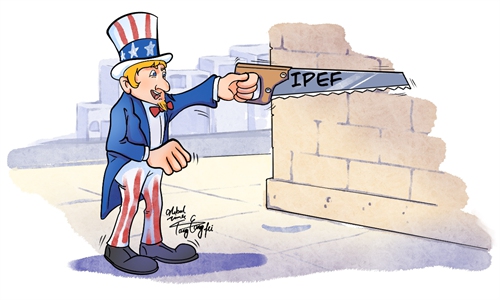
Illustration: Xia Qing/Global Times
Trade negotiators from 14 member countries of the US-led Indo-Pacific Economic Framework (IPEF) are reportedly set to meet in Bali, Indonesia this week for the second negotiating round of the economic framework. Launched in May 2022, IPEF is widely seen as a central part of Washington's Indo-Pacific Strategy.By setting high standards and rules on trade and investment under the IPEF, Washington is attempting to persuade its allies and partners to believe that the US is committed to "offering tangible and concrete benefits to the partner countries participating in IPEF." However, the IPEF, a geopolitical tool disguised as an economic framework, doesn't seem attractive enough as it cannot offer what the other countries really want.
At present, the global economy is suffering from multiple hits of high inflation and geopolitical conflict, with developing economies in the Asia-Pacific region bearing the brunt. Amid economic uncertainty caused by sluggish global demand, export-oriented economies in the Asia-Pacific region urgently need to expand their exports to the US as well as European markets. This may explain why some Asia-Pacific economies are still interested in the US-led IPEF although US hegemony is believed to have weakened.
However, the IPEF is not a traditional free trade agreement and offers no tariff relief to the countries that join. With the first negotiating round that was held in December 2022 in Australia, and a special negotiating round on Pillars II-IV that was held in February in New Delhi, India, Washington has yet to articulate how its initiative can promote trade and investment among IPEF members. Without market access or tariff reduction provisions in the framework, the IPEF's economic terms are empty and innately inadequate. Export-oriented economies in the Asia-Pacific region should not have the illusion that IPEF can bring tangible benefits and they can expand their exports to the US market under the economic framework.
IPEF negotiations come at a time when the administration of US President Joe Biden is adopting a strategy aimed at resurrecting US manufacturing. It seems trade protectionism is rising as Washington looks to expand US domestic manufacturing sector, and the rise of protectionism is certain to disrupt the global industrial chain, so for Asia-Pacific economies it has been almost impossible to enjoy a tariff reduction and expanded market access from the US.
As trade protectionism and unilateralism are creating an unprecedented negative impact on free trade, now is the time to break any illusions about what the IPEF actually represents.
As trade negotiators gather for the IPEF, the US may try to push negotiation in a direction that serves Washington's geopolitical interests and isolates China in the Asia-Pacific region, but such efforts go against the interests of Asia-Pacific economies and will disrupt regional industrial and supply chains. At present, it should be pointed out that Asia-Pacific needs cooperation, not division.
Asia-Pacific countries should not be kidnapped by IPEF. They should drop their illusion and strengthen economic cooperation among regional economies based on win-win and mutual respect.
The US is attempting to use IPEF to woo other regional economies to "decouple" from China's economy and exclude China from regional supply chains, but its efforts are doomed to fail.
China is an important player in Asian industrial and supply chains. The country has a complete industrial chain, well-developed logistics and supporting systems, and is steadily becoming a crucial market for industrial manufactured goods produced in Asia-Pacific region. As China unwaveringly expands its opening-up, Asia-Pacific countries will form closer industrial chain links and economic and trade relations with China.
Economic "decoupling" from China would bring economic disaster and tumult to the region. As long as China keeps the right direction concerning domestic and foreign policies and continues its opening-up, the US will be unable to weaken China's influence in the region.
The author is a reporter with the Global Times. bizopinion@globaltimes.com.cn



